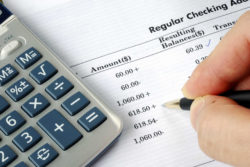Top Class Actions’s website and social media posts use affiliate links. If you make a purchase using such links, we may receive a commission, but it will not result in any additional charges to you. Please review our Affiliate Link Disclosure for more information.

When consumers write a check, they generally assume that their check will go through and that there is sufficient money in their account. However, something as simple as an unexpected bill or a miscommunication with a spouse can result in unexpected fees such as multiple returned item fees.
These fees are charged by a bank when a payment exceeds the amount in an account, or when a check is “bounced”. A consumer may also incur these fees when attempting to withdraw money from an ATM.
In most states, the maximum returned check fee is $30, although some states have a limit as low as $20.
The highest maximum is found in Delaware where returned check fees can reach $40. In Florida, Georgia, Louisiana, and Ohio, maximums are calculated based on the amount a check is worth. Websites like Wallet Hub have resources available for consumers to check what the maximum returned payment fee is under their state’s laws.
According to Opp Loans, the easiest way for consumers to avoid nonsufficient fund or returned payment fees is to balance their checkbook and keep an eye on account balances. This makes sure that consumers do not write checks that exceed the amount in their checking account.
It is important to note that returned item fees are not the same as overdraft fees. Overdraft fees are charged to a consumer in connection with an overdraft protection program that pays the transaction instead of rejecting it.
To reflect the differences, federal regulations differ between these two fees. Banks and credit unions are not allowed to charge overdraft fees on one-time debit and ATM transactions if they have not opted into a program. This is not the case for returned item or nonsufficient fund fees. Another main difference is that with overdraft fees, the transaction is completed. With returned check fees, the transaction is not completed and is instead returned.
The Consumer Financial Protection Bureau notes that “banks and credit unions are allowed to charge you overdraft fees when the bank or credit union pays a check or certain recurring electronic payments that would have overdrawn your account, even if you did not opt in.”
Although banks are permitted to charge these fees to consumers without them opting in, this does not excuse any fraudulent or deceptive behavior by a bank in regard to returned item or nonsufficient fund fees. Consumers who believe that their financial institution is unlawfully charging these fees or charging fees in a purposefully deceptive manner may be able to take legal action for misleading and unlawful behavior.
Some lawsuits against financial institutions claim that it is unlawful to charge multiple returned check fees on a single transaction. Some banks or credit unions may do this by attempting to process a transaction multiple times, assessing an NSF fee each time the transaction fails. Consumers argue that this practice may not be outlined in contract terms and is unlawful.
Join a Free Returned Item Fee Class Action Lawsuit Investigation
If you were charged multiple returned item fees (also known as NSF fees or insufficient funds fees) on the same transaction by your bank, you may be entitled to compensation.
ATTORNEY ADVERTISING
Top Class Actions is a Proud Member of the American Bar Association
LEGAL INFORMATION IS NOT LEGAL ADVICE
Top Class Actions Legal Statement
©2008 – 2024 Top Class Actions® LLC
Various Trademarks held by their respective owners
This website is not intended for viewing or usage by European Union citizens.















5 thoughts onWhy Do Banks Charge Returned Item Fees?
My bank has done this to me plenty of times please sign me up
Please add me
Yes,my bank also was doing this thing to me, till the point that the damage to my account has been done.
My bank has been doing this to me and getting away with it by reversing some fees, yet the damage has been done with the payees.
I believe my bank did this to me.